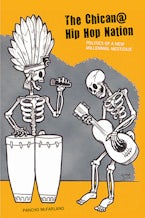The population of Mexican-origin peoples in the United States is a diverse one, as reflected by age, class, gender, sexuality, and religion. Far from antiquated concepts of mestizaje, recent scholarship has shown that Mexican@/Chican@ culture is a mixture of indigenous, African, and Spanish and other European peoples and cultures. No one reflects this rich blend of cultures better than Chican@ rappers, whose lyrics and iconography can help to deepen our understanding of what it means to be Chican@ or Mexican@ today. While some identify as Mexican mestizos, others identify as indigenous people or base their identities on their class and racial/ethnic makeup. No less significant is the intimate level of contact between Chican@s and black Americans. Via a firm theoretical foundation, Pancho McFarland explores the language and ethos of Chican@/Mexican@ hip hop and sheds new light on three distinct identities reflected in the music: indigenous/Mexica, Mexican nationalist/immigrant, and street hopper. With particular attention to the intersection of black and Chicano cultures, the author places exciting recent developments in music forms within the context of progressive social change, social justice, identity, and a new transnational, polycultural America.
ContentsForeword by Rubén O. MartinezPrefaceAcknowledgmentsPart 1. Setting the Theoretical ContextChapter 1. Quién es más macho? Quién es más Mexicano?: Chican@ and Mexican@ Identities in RapChapter 2. Barrio Logos: The Sacred and Profane Word of Chicano EmceesPart 2. Identities Old and NewChapter 3. Sonido Indígena: Mexica Hip-Hop and Masculine IdentityChapter 4. Paísas, Compas, Inmigrantes: Mexicanidad in Hip-HopChapter 5. Barrio Locos: Street Hop and Amerikan IdentityPart 3. Mexicanidad, AfricanidadChapter 6. Multiracial Macho: Kemo the Blaxican’s Hip-Hop MasculinityChapter 7. The Rap on Chicano/Mexicano and Black Masculinity: Gender and Cross-Cultural ExchangeChapter 8. “Soy la Kalle”: Radio, Reggaetón, and Latin@ IdentityPart 4. Hip-Hop and JusticeChapter 9. Teaching Hip-Hop: A Pedagogy for Social JusticeAfterword: Hip-Hop and Freedom-Dreaming in the Mexican DiasporaAppendix: Music SourcesNotesReferencesIndex

